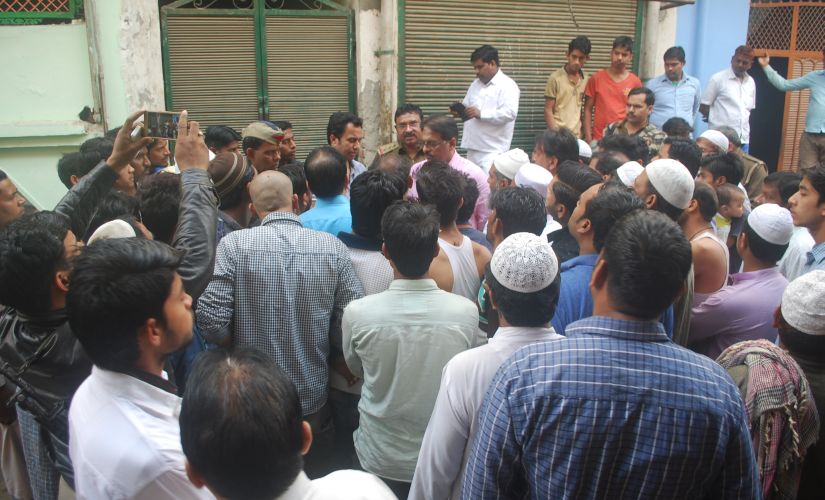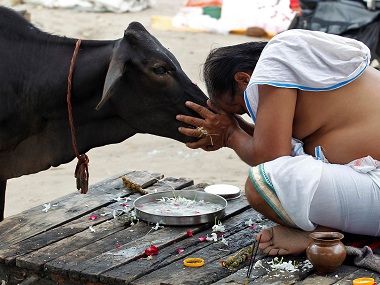Editor’s Note: A few days after Yogi Adityanath took charge as the new chief minister of Uttar Pradesh, and issued proclamations that his government would vigorously pursue and prosecute those “malfeasants” engaged in — variously — the running of illegal slaughterhouses, and harassing women on the streets, Firstpost asked Arpit Parashar to file ground reports documenting the doings of law enforcement forces deployed to shut meat shops, and apprehend “Romeos”. This is the second in a multi-part series of stories Parashar sent us. As the Yogi Adityanath government came to power in Uttar Pradesh and the crackdown on the illegal slaughterhouses and meat sellers began, a sense of quiet triumphalism prevailed in the offices and among the workers of the Bharatiya Janata Party (BJP). The initial shock of a remarkable and unprecedented landslide victory had not yet subsided when, across districts of western UP there was a murmur doing the rounds: the Muslims will have it now. “Zarurat se zyada sar pe chadha rakha thha in logon ko (They have been given undue importance and gratitude),” says Ranjan Sharma, a BJP worker from Ghaziabad. As the Yogi Adityanath cabinet was sworn in and Prime Minister Narendra Modi’s slogan of ‘sabka saath, sabka vikaas’ reverberated across lanes, streets, roads and highways it was clear that rioting or hooliganism will not be tolerated. To his credit, as the chief minister, Yogi Adityanath has passed instructions on those lines. While the BJP is panic-stricken and still strategising about the road ahead and paths to be taken and/or forsaken, workers on the ground are simply wishing to see the Muslims suffer. And it is evident in the streets.
While this might seem like a case of religious fanaticism in nature, reasons for the envy and resentment towards Muslims are shallow, not deep-rooted. It is a deadly concoction of politico-economic rivalry.
While Muslims have always been a strong voter-base in western Uttar Pradesh, they have transitioned in substantial numbers to the mainstream only in the post-liberalisation era. Most urban centres, like Meerut, Ghaziabad, Muzaffarnagar and even Moradabad were Hindu-dominated till two decades ago but with the rise in fortunes in the meat-selling business and an upswing in opportunities for the service industry, demographics have changed. Muslims are active players in the worker-class profession and have cashed in on traditional knowledge and hard labour, coupled with favourable political environment, in general. As a result, most urban areas have seen a dominance of Muslims in the voter lists, disturbing the traditional routs of the Brahmin-Baniya combination which helped BJP through the decades, even when the Congress was in power in the country. This rise in economic stability and political protection, which the BJP terms patronage and favouritism, is the underlying theme of discussion among the party workers nowadays.
“The Muslims will be under control now; they will be under the Hindus. No need for them to panic, but they should know and acknowledge that we are a Hindu country and culture,” says Chirag Chaudhary, a BJP worker from the Sardhana constituency in Meerut, a BJP stronghold.
[caption id=“attachment_3370606” align=“alignnone” width=“825”] Crowd gathered at Lohia Mandi in Ghaziabad where a hotel was shutdown for selling buffalo meat. Image courtesy: Arpit Parashar[/caption] Sangeet Som, who is considered BJP chief Amit Shah’s Man Friday in western Uttar Pradesh, represents Meerut in the present assembly and he did so in the last assembly as well. Som was found instigating Hindus to attack Muslims during the 2013 Muzaffarnagar riots and was arrested only to be released later on bail. He won this time too from his seat, although the Samajwadi Party candidate Atul Pradhan gave him a good fight and was defeated only due to the votes that swung towards the BSP. Political considerations notwithstanding, the workers are rooting for economic retribution, which entails dangerous consequences for the Muslims in the state. “These people have made money by selling cow and buffalo meat but we don’t want to let it go on.” Even though cow slaughter has been banned in Uttar Pradesh for decades, and only buffalo is allowed to be slaughtered, procured and sold, most of which is exported, the call from among the party workers is for a total ban on meat products sold by Muslims. Work on establishing this state of satisfaction in lieu of poverty for the Muslims is in full swing. In almost every BJP office in the districts of western Uttar Pradesh, dedicated teams have been constituted to keep track of every meat shop in the region and to file complaints against them on one account or the other. In most cases, it is the local leaders who solve the problems for them by calling in the police and complaining that the ‘rules’ were not being followed by the meat shop owners. Beef is not sold in any city market in the districts. It is still sold in the outskirts and among villagers, who are the primary purchasers since it is the cheapest meat. The modus operandi is to complain on ‘rules and regulations’ which are almost never followed and implemented by the book. Officials, especially the police, have no option but to examine all paper work regarding the meat shops against whom the complaints are filed. They, too, are in a fix nowadays, since they have never bothered to read the National Green Tribunal (NGT) directions of 2015 and other related rules. In some cases, they have beaten up residents from the areas where the meat shops were being run. “When we asked them if they had a warrant or if there was even a complaint, they said they do not need complaints anymore. There is no beef sold here and all shop owners have licenses. Yet, the officials have regularly been harassing us, which is why the strike (by meat shop owners of Uttar Pradesh) was called in the first place,” said Hanif Qureshi, a resident of Patharwalon Ka Mohalla in old Meerut city, who owns a shop that sells chicken and mutton. [caption id=“attachment_3370614” align=“alignnone” width=“825”]
 Police, who has been aggressively cracking down on hotels selling buffalo meat, are in a fix too, since they have never bothered to read the NGT directions of 2015 and other related rules. Image courtesy: Arpit Parashar[/caption] The experiences have been particularly bad for people from areas in these districts where beef, which is buffalo meat and not cow meat, is commonly sold or served at the local eateries, whether on roadside stalls, hotels or dhabas. Many of the local labourers and people who work in various labour-intensive factories depend on these hotels for their daily meals but shutting down these places have delivered a blow to them. In many cases, like at the Loha Mandi in Ghaziabad, where recently those who expected a hotel to be open so that they could have lunch, launched into an impromptu sloganeering when police officials were seen ‘inspecting papers’; the inspection went on for many hours. “It was just to tell us that we would go back hungry and that the hotels would not be allowed to open that day, or anytime soon. This is like depriving us of our basic food,” says Kashif Khan, a resident of Vijay Nagar in Ghaziabad who regularly visits Loha Mandi area for lunch till the shutters were downed. Hearing a case on delay in issuing license for a meat shop, the Lucknow bench of the Allahabad High Court on 3 April said that food and trade in foodstuff is constitutionally guaranteed under the right to live. The bench comprising of Justice Amreshwar Pratap Sahi and Justice Sanjai Harkauli said, “To provide an immediate check on unlawful activity should be simultaneous with facilitating the carrying of lawful activity, particularly that relating to food, food habits and vending thereof that is undisputedly connected with the right to life and livelihood.” In context of the complete ban on sale of meat products in the state, the bench also said that it is the state’s duty to ensure the provision of sale of food conducive to health. While the government counsel pleaded that the state government was acting to implement the rules set by the NGT and the Supreme Court through its orders, the justices said that the government inaction “should not be a shield for imposing a state of almost prohibition.” The court also criticised the crackdown immediately after the BJP government was sworn in. The BJP cadres are in no mood to let go of the aggression with which they have been targetting the meat sellers. And the officials in Yogi raj will have to play by their book in the near future; unless the perverted urge for retribution, which has started to reek of blatant communalism, is reined in soon. Read the first story of the series here: _Yogi Adityanath govt taking political advantage of negligent local authorities_
Police, who has been aggressively cracking down on hotels selling buffalo meat, are in a fix too, since they have never bothered to read the NGT directions of 2015 and other related rules. Image courtesy: Arpit Parashar[/caption] The experiences have been particularly bad for people from areas in these districts where beef, which is buffalo meat and not cow meat, is commonly sold or served at the local eateries, whether on roadside stalls, hotels or dhabas. Many of the local labourers and people who work in various labour-intensive factories depend on these hotels for their daily meals but shutting down these places have delivered a blow to them. In many cases, like at the Loha Mandi in Ghaziabad, where recently those who expected a hotel to be open so that they could have lunch, launched into an impromptu sloganeering when police officials were seen ‘inspecting papers’; the inspection went on for many hours. “It was just to tell us that we would go back hungry and that the hotels would not be allowed to open that day, or anytime soon. This is like depriving us of our basic food,” says Kashif Khan, a resident of Vijay Nagar in Ghaziabad who regularly visits Loha Mandi area for lunch till the shutters were downed. Hearing a case on delay in issuing license for a meat shop, the Lucknow bench of the Allahabad High Court on 3 April said that food and trade in foodstuff is constitutionally guaranteed under the right to live. The bench comprising of Justice Amreshwar Pratap Sahi and Justice Sanjai Harkauli said, “To provide an immediate check on unlawful activity should be simultaneous with facilitating the carrying of lawful activity, particularly that relating to food, food habits and vending thereof that is undisputedly connected with the right to life and livelihood.” In context of the complete ban on sale of meat products in the state, the bench also said that it is the state’s duty to ensure the provision of sale of food conducive to health. While the government counsel pleaded that the state government was acting to implement the rules set by the NGT and the Supreme Court through its orders, the justices said that the government inaction “should not be a shield for imposing a state of almost prohibition.” The court also criticised the crackdown immediately after the BJP government was sworn in. The BJP cadres are in no mood to let go of the aggression with which they have been targetting the meat sellers. And the officials in Yogi raj will have to play by their book in the near future; unless the perverted urge for retribution, which has started to reek of blatant communalism, is reined in soon. Read the first story of the series here: _Yogi Adityanath govt taking political advantage of negligent local authorities_


)
)
)
)
)
)
)
)
)



